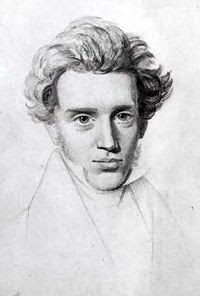Søren Kierkegaard (1813-1855) was a Danish theologian, philosopher, and, according to some, a poet (I will elaborate on this under the heading “poetry” later on). This and my next several blog posts will be an attempt to give a tiny peek at some some of Kierkegaard’s most profound ideas, ideas which I believe suggest creative solutions for many of the pitfalls of contemporary American Christianity.
WORD #1:
Maieutic [mä-YOO-tik] : of or denoting the Socratic mode of inquiry, which aims to bring a person’s latent ideas into clear consciousness.
The word maieutic comes from the greek word for “midwife.” This is how Kierkegaard understood his work as an author; as one who comes alongside and helps during the painful and strenuous work of birth. The maieutic mode of teaching does not concern itself with introducing new information, in seeing how many facts it can cram into the learner’s head, rather it seeks to draw out what the learner already knows, to help the learner to live out of their knowledge with passion and authenticity.
Thus, the maieutic teacher does not even teach in the sense we normally experience teaching at school (or even at church, which, in my opinion is a big problem). You do not go to learn from the maieutic teacher because he or she is doing groundbreaking research on Flashy New Subject X, nor do you go to discover a few esoteric truths only available to a handful of initiates. Instead you go to be changed or remade, to ignite a concern for life, to make things matter that had ceased to matter for you. For this reason Kierkegaard claimed that he never taught anything that a 16-year-old girl did not already know, he simply tried to make this knowledge valuable again.
A good example of this kind of communication applied to faith (though good examples abound in Kierkegaard’s writing) is Kierkegaard’s cherished work, Fear and Trembling. Fear and Trembling is a meditation on the story of Abraham from the book of Genesis. Kierkegaard, writing under the pseudonym Johannes de Silentio (“John of Silence”), aims to juxtapose the raw, gutsy faith of Abraham against the easy, speculative pseudo-faith of his era. In the end, Silentio has succeeded if the reader is shocked and perhaps even horrified by Abraham’s faith and the price he was called to pay in following it: he had to be ready to kill his own son. Overall, Johannes de Silentio may not present clear, airtight theology, but he certainly puts some muscle back into one notoriously weak and overused word (in Kierkegaard’s time just as in ours): faith.
In an era where information is so readily available--not to mention an economy that is increasingly information based--there is a lot of talk about communication and not enough talk about the vocation of teaching. We assume that the ability to transfer ever-larger files at ever-increasing speeds will somehow make all of our lives better--and perhaps there is a sense in which it can, but not without teachers that come alongside students and help them live out of the depths that they already have within them.
To paraphrase something Kierkegaard writes in The Concluding Unscientific Postscript to Philosophical Fragments: it is healthier to know a few things that matter to you and to live them out with all of your passion than to know everything there is to know and let it remain a set of cold and meaningless facts.
The remarkable thing about the maieutic teacher is that the more the student learns, the more the teacher fades into the background, because after all, the teacher was only there to help the student stand on his/her own. Kierkegaard considers this a gift that can only come through love. More on this to follow.




